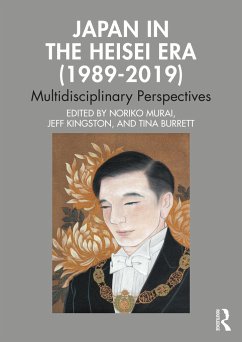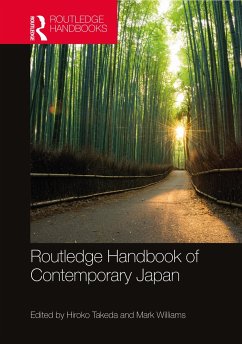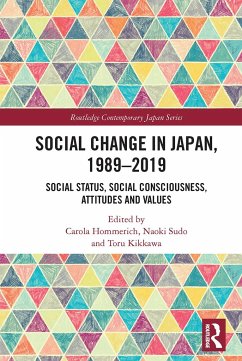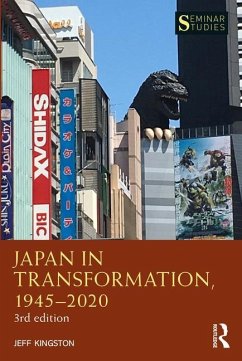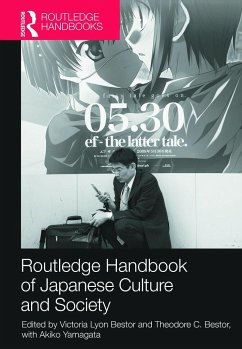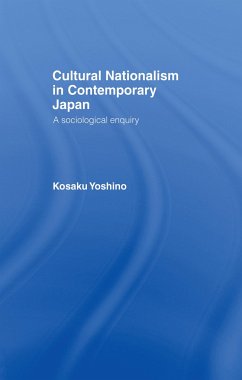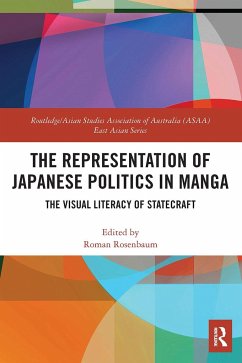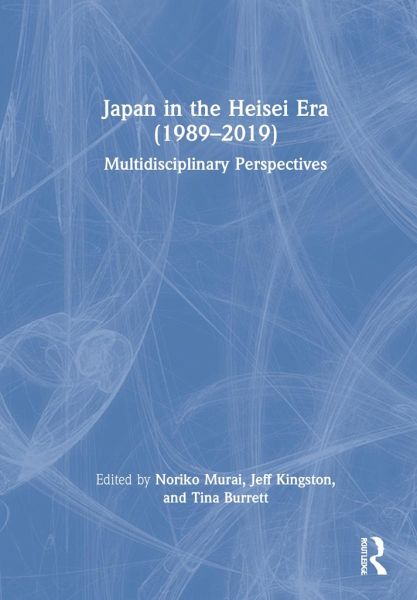
Japan in the Heisei Era (1989-2019)
Multidisciplinary Perspectives
Herausgegeben: Murai, Noriko; Kingston, Jeff; Burrett, Tina
Versandkostenfrei!
Versandfertig in 6-10 Tagen
154,99 €
inkl. MwSt.

PAYBACK Punkte
77 °P sammeln!
Japan in the Heisei Era (1989-2019)provides a retrospective and multidisciplinary account of a society in flux. Featuring analyses from leading scholars around the globe, this textbook examines the evolving contexts of Japan throughout the Heisei era and how longstanding verities and values have been called into question. Asking what this holds for Japan's future relations with the world and within its own communities, chapters delve beneath the layers of a complex and increasingly diverse society, exploring topics including simmering ethnonationalism, economic torpor, political stagnation, an...
Japan in the Heisei Era (1989-2019)
provides a retrospective and multidisciplinary account of a society in flux. Featuring analyses from leading scholars around the globe, this textbook examines the evolving contexts of Japan throughout the Heisei era and how longstanding verities and values have been called into question. Asking what this holds for Japan's future relations with the world and within its own communities, chapters delve beneath the layers of a complex and increasingly diverse society, exploring topics including simmering ethnonationalism, economic torpor, political stagnation, and cultural dynamics.
Features of this textbook include:
Analysis of key social issues ranging from immigration, civil society, press freedom, politics, labour and the economy, to diversity, the marginalisation of women, Shinto, and Aum ShinrikyoEvaluation of the legacy of Emperor Akihito on war memory, the imperial institution, art, regional relations, and constitutional revisionMultidisciplinary insights from both the social sciences and humanitiesRich illustrations for visual analysis of developments in contemporary Japanese literature, film, art, and pop culture
Providing students with dynamic analyses of how contemporary Japanese society continues to transform, this textbook is essential reading for students of Japanese Studies, including Japanese culture, society, history, and politics.
The Introduction and Chapter 19 of this book are freely available as a downloadable Open Access PDF at http://www.taylorfrancis.com under a Creative Commons Attribution-Non Commercial-No Derivatives (CC-BY-NC-ND) 4.0 license.
provides a retrospective and multidisciplinary account of a society in flux. Featuring analyses from leading scholars around the globe, this textbook examines the evolving contexts of Japan throughout the Heisei era and how longstanding verities and values have been called into question. Asking what this holds for Japan's future relations with the world and within its own communities, chapters delve beneath the layers of a complex and increasingly diverse society, exploring topics including simmering ethnonationalism, economic torpor, political stagnation, and cultural dynamics.
Features of this textbook include:
Analysis of key social issues ranging from immigration, civil society, press freedom, politics, labour and the economy, to diversity, the marginalisation of women, Shinto, and Aum ShinrikyoEvaluation of the legacy of Emperor Akihito on war memory, the imperial institution, art, regional relations, and constitutional revisionMultidisciplinary insights from both the social sciences and humanitiesRich illustrations for visual analysis of developments in contemporary Japanese literature, film, art, and pop culture
Providing students with dynamic analyses of how contemporary Japanese society continues to transform, this textbook is essential reading for students of Japanese Studies, including Japanese culture, society, history, and politics.
The Introduction and Chapter 19 of this book are freely available as a downloadable Open Access PDF at http://www.taylorfrancis.com under a Creative Commons Attribution-Non Commercial-No Derivatives (CC-BY-NC-ND) 4.0 license.





